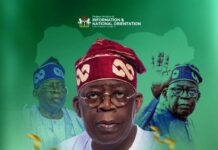By Abu, I. Michael.
Take it or leave it, one credit that must be given to President Ahmed Bola Tinubu is the audacious repositioning of the Nigeria’s administrative structure and system of governance which previous leaders lacked the willpower to effect. This obvious act in the spirit of the “Renewed Hope Agenda” is to ensure efficient performance by public institutions and effective delivery of goods and services to the citizenry. Tinubu decided not to engage the reverse-gear like some of the presidents before him to enable the country progress to its destined glory.
Paramount to the modern state or a country, is defence and security; welfare and socioeconomic sustenance; and the guarantee of foreign interactions which the government cannot afford to relinquished. The government as an agency of the state makes and enforces relevant laws for orderliness and ensures leadership that is accountable. The functions of the Federal Government of Nigeria extractable according to Baron de Montesquieu’s theory for the system of government being practiced by the United States of America are basically maintenance of law and order, protection of lives and properties, provision of welfare services, promotion of economic development, promotion of democracy and social order, protection of human rights, maintenance of external relations, and creation of job/employment opportunities.
The consistent successful performance of these functions meant to increase values in the lives of Nigerians is a priority, and so several establishments are birthed with various mandates to carry out these functions. However, these mandates often remain expressed on documents rather than being translated into concrete terms; and this is due to administrative sloppiness engendered by poor institutional arrangements. These administrative untidiness in our democratic structure has called for various reforms over the years.
One of the establishments that deserves focused attention of Mr. President, I must say, is the Office of the Surveyor General of the Federation considering its centrality and relevance to national security, administration and governance in a broad-spectrum. OSGoF is Nigeria’s apex surveying and mapping agency. The world over, and especially in the well developed countries, their surveying and mapping agencies remain the bride of government and booster behind the affluence of a country. Such agency is usually free from bureaucratic rigidness for its smooth operations and timely delivery of its inputs. OSGoF defines the entity calls Nigeria, and it is responsible for the boundary location (pillars), and it is the repository of essentially the geospatial data of the Federal Government and Nigeria; and, a member of the Board of Border Community chaired by the Vice President of the Federal Republic of Nigeria. There has been the question as to which of the government ministries’ ministers should OSGoF be positioned under for supervision to enable her function appropriately and effectively. In the colonial era, the surveyor general of the country operates under the governor general such that at the absence of the governor general, the surveyor general was expected to administer. However, the wisdom as to the most appropriately place to situate OSGoF or any other agencies lies with the government.
Placing such an office under a particular establishment undermines the relevance of its functions and demeans the upshot of its centrality to any of the sectors of the economy, industries and for the sake of emphasis, all MDAs. The reinforcement of this view is in the appreciation of the scope and functions of the technical departments of OSGoF. OSGoF is an extra-Ministerial Office of the Federal Government of Nigeria saddled with the constitutional roles as captured in the Second Schedule, Part ll, Section 4, Item K, Paragraph 25 of the Nigerian Constitution 1999 as amended to perform trigonometrical, cadastral and topographical surveys. Its statutory role is the provision of geospatial data/needs of the Government and various sectors of the economy for reliable decisions, effective planning and implementation. It is the Office that implements the provisions of the Survey Coordination Act of 1962 with its subsequent amendments. The implications of the act on matters of National Security is overarching, one of the major reasons of her strategic collaboration with State Governments through their state surveyor generals, the Military, the Police and other security agencies. To achieve its mandate as solutions provider, the Office comprises thirteen (13) Technical Departments: Hydrography, Geodesy, Cadastral, Infrastructure, Intelligence Survey, International Boundary, Internal Boundary, Photogrammetry and Remote-Sensing, Survey Coordination, Geospatial Engineering, Cartography and GIS, Special Duties (Survey), Planning, Research and Documentation.
A synopsis of the functions of these aforementioned departments of OSGoF which space will not permit me to state will reveal the fascinating and remarkable nature of surveying and geoinformatics. OSGoF is relevant to the development and improvement of our defence and security, telecommunication networks, agriculture, harnessing of natural resources, housing and roads infrastructure, health, aviation, marine and blue economy, oil and gas, disaster management, and so on and so forth. Achievements cannot be recorded in any enterprises without making good decisions, effective planning and execution; the right tools for these are surveying and geoinformatics. The functions of OSGoF cut across all MDAs and sectors; and this underscores the ornate importance of the Office to the country.
Michael is the Head of Press and Public Relations,
Office of the Surveyor General of the Federation.





